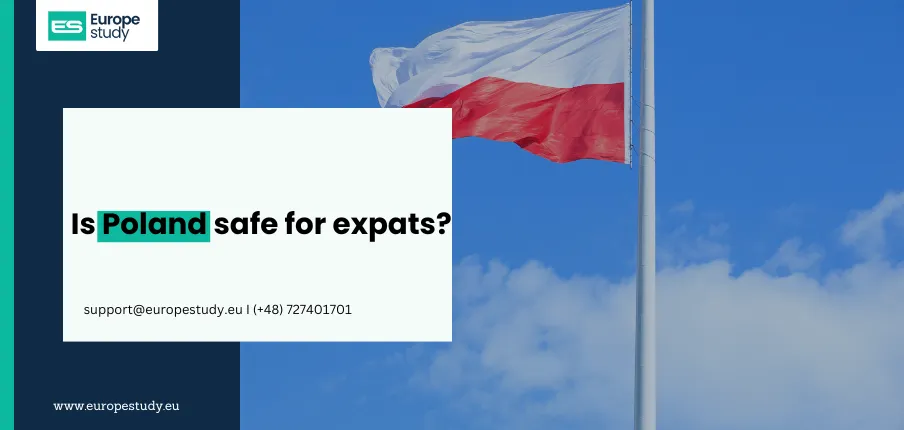
Is Poland Safe for Expats?
When it comes to moving to a new country, safety is one of the top concerns for expats. If you're considering living and working in Poland, you might be wondering how safe the country is for foreigners. The good news is that Poland is generally considered a safe destination for expats. With a low crime rate, friendly locals, and a welcoming culture, Poland offers a secure environment for those looking to relocate. However, like any other country, there are a few things you should keep in mind to ensure your safety while living there.
1. Crime Rate in Poland
Poland has a relatively low crime rate compared to other European countries. According to recent statistics, violent crime is uncommon, and the overall crime levels have been steadily declining in recent years. Petty crimes like pickpocketing can occasionally happen, especially in crowded areas such as tourist spots or public transport hubs, but they are not rampant.
Most cities, including Warsaw, Kraków, and Wrocław, are very safe for expats, with neighborhoods generally being well-patrolled by police. It's always a good idea to stay aware of your surroundings in busy places, just as you would in any large city, but Poland is considered much safer than many major cities around the world.
2. Poland’s Political Stability
Poland is a stable, democratic country with a well-established legal system. While there may be occasional protests or political demonstrations, these are typically peaceful and well-controlled by the authorities. The country is a member of the European Union and NATO, which adds to its stability and overall safety. Expats can feel confident that Poland is a secure place to live with a good standard of governance and public services.
3. Healthcare and Emergency Services
Poland has a solid healthcare system, both public and private. Expats are eligible for public health insurance if they are employed, and many choose to also take out private health insurance for faster access to medical services. The quality of medical care is generally high, especially in major cities. Emergency services, such as police, fire, and medical assistance, are quick to respond, and English is often spoken in hospitals and police stations in larger cities.
4. Safety in Major Cities
- Warsaw: Poland’s capital is one of the safest cities in the country. With modern infrastructure and plenty of international expat communities, Warsaw is known for its low crime rate and high standard of living.
- Kraków: This historical city, popular with tourists and expats alike, has a vibrant culture and low crime rates. The Old Town area, although busy, is generally safe, and you’ll find a welcoming atmosphere for foreigners.
- Wrocław and Gdańsk: Both are considered safe and enjoyable cities to live in. They offer great public services, excellent public transport, and plenty of recreational activities. Like most cities, it’s always a good idea to avoid poorly lit areas at night, but they are generally low-risk for crime.
5. Cultural Safety
Poland is a relatively homogenous country, but the locals are generally warm and welcoming toward foreigners. Poland has a long history of international exchange, and big cities like Warsaw, Kraków, and Gdańsk have thriving expat communities. Expats can often find support and make friends through cultural events, social groups, and online forums.
That being said, cultural differences may occasionally pose challenges for newcomers, particularly for those from countries with more diverse or liberal social norms. However, any misunderstandings can usually be addressed with respect and understanding, and Poles are generally patient with expats learning the language and adjusting to local customs.
6. Traffic Safety
Poland has good infrastructure, but like many countries, road safety can vary. Major roads are well-maintained, but drivers can sometimes be aggressive, especially in busy city traffic. Pedestrian safety is generally a priority, but it’s wise to be cautious when crossing streets, particularly in less pedestrian-friendly areas.
If you’re planning to drive, you should familiarize yourself with local traffic rules. Poland has strict driving laws, and traffic fines can be substantial for infractions. Public transportation, including buses, trams, and trains, is also safe, reliable, and affordable in most cities.
7. Natural Disasters and Safety Concerns
Poland is not prone to major natural disasters, but like many European countries, it occasionally experiences extreme weather conditions, including heavy snow in the winter months and flooding in certain regions. Being prepared for weather changes and keeping informed through local news is essential, especially if you plan to live in rural or flood-prone areas.
8. Emergency Numbers
In case of an emergency, it's good to know the local emergency numbers. Poland’s emergency services can be reached at:
- Police: 112 or 997
- Ambulance: 112 or 999
- Fire Department: 112 or 998
These numbers are available 24/7, and you’ll often find that operators can speak at least some English, especially in bigger cities.
Conclusion
Overall, Poland is a very safe country for expats. With its low crime rates, reliable healthcare, political stability, and welcoming communities, Poland offers a secure environment for those looking to move there for work, study, or leisure. Like any country, exercising basic caution in public spaces, learning about local customs, and staying informed about safety tips will help ensure a positive experience while living in Poland.
Whether you’re moving to Warsaw, Kraków, or any other city in Poland, you can feel confident that you’ll be living in one of Europe’s safest and most beautiful countries.





